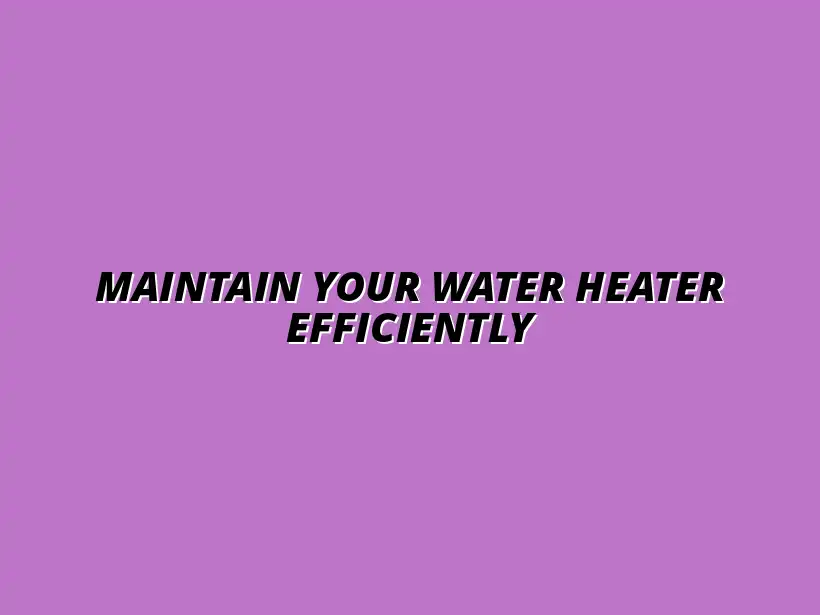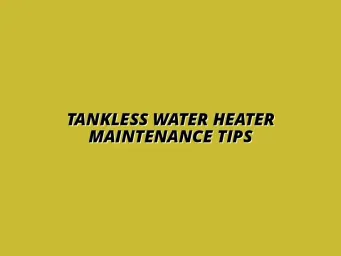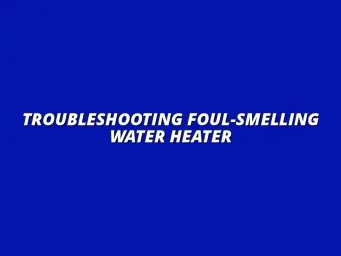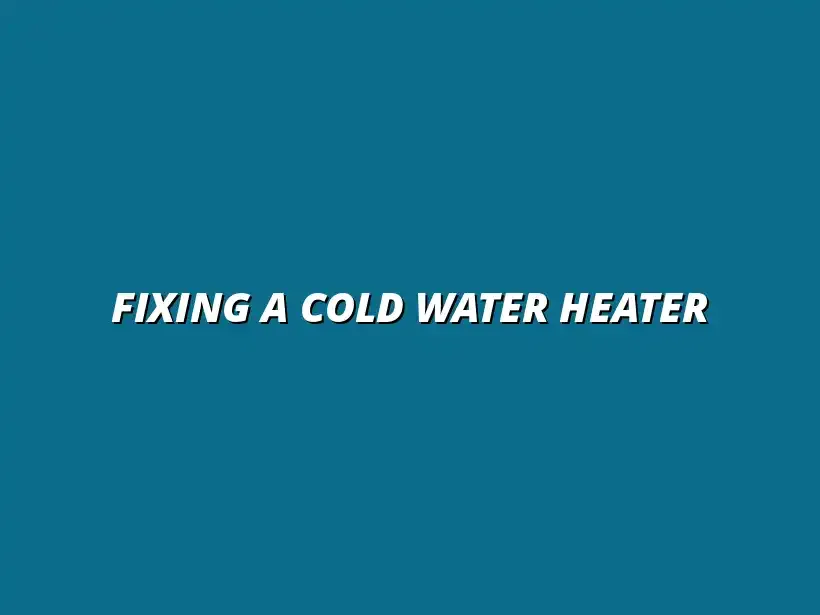
Maintain Your Water Heater Efficiently
Understanding the Importance of Water Heater Maintenance
Water heaters play a vital role in maintaining comfort in our homes. They deliver hot water for showering, cooking, and cleaning, making them an essential part of our daily routine. When functioning well, they provide comfort and convenience, but neglecting maintenance can lead to unexpected issues and costly repairs!
Regular maintenance ensures that your water heater runs smoothly and efficiently. Just like your car needs regular oil changes, your water heater requires care too! By keeping up with maintenance, you can extend the lifespan of your unit and avoid sudden breakdowns.
The Role of Water Heaters in Home Comfort
Imagine a cold winter morning, and you turn on the tap expecting hot water, only to be met with icy cold! That's where a reliable water heater comes into play. These units not only provide comfort but also contribute to overall hygiene in our homes.
They allow us to enjoy warm showers, clean dishes, and comfortable laundry experiences. A well-functioning water heater is crucial for our daily activities, enhancing our quality of life significantly!
- Provides hot water for bathing and cleaning.
- Enables cooking with hot water.
- Improves overall home hygiene and comfort.
Why Regular Maintenance is Essential for Efficiency
Before we dive into maintenance, let’s talk about efficiency! A well-maintained water heater operates more efficiently, leading to lower energy bills. Neglect can cause buildup, leading to increased energy consumption and higher costs.
Regular checks can prevent small issues from becoming major headaches. For instance, sediment buildup in tank heaters can cause them to use more energy than necessary! Emphasizing maintenance can save you money in the long run.
- Reduces energy costs.
- Increases the lifespan of the unit.
- Prevents unexpected breakdowns.
Key Components of Your Water Heater and Their Functions
Understanding your water heater's components can make maintenance easier. Many homeowners often overlook these parts, but knowing their functions can help you identify issues quickly!
Moreover, when I worked on plumbing in various homes, I noticed that many homeowners are unaware of how their water heater operates. This knowledge not only empowers you but also helps you communicate better with your plumber!
Overview of Water Heater Types: Tank vs. Tankless
There are two main types of water heaters: tank and tankless. Each type has its benefits and considerations. Let’s briefly compare the two!
- Tank Water Heaters: Store hot water in a tank and supply it as needed. They typically have lower upfront costs but can take up more space.
- Tankless Water Heaters: Provide hot water on demand without a storage tank. They tend to be more energy-efficient but may require higher initial investments.
Identifying Key Components: Anode Rod, Thermostat, and Heating Elements
Each water heater contains specific components that require attention. For instance, the anode rod helps prevent corrosion, while the thermostat regulates the water temperature.
Knowing these parts can help you when discussing maintenance with a professional like the experts at Plumb Pro Care. Ensuring these components are in good condition can lead to smooth operation!
- Anode Rod: Prevents rust and corrosion.
- Thermostat: Controls water temperature.
- Heating Elements: Heats the water in tank systems.
Common Water Heater Problems and Their Solutions
Water heaters can run into a few common problems, and knowing what to look for can save you time and money! By understanding the typical issues, you can address them quickly or know when to call for help. Many homeowners, including my clients at Plumb Pro Care, often benefit from staying informed about their water heater's health. Let’s dive into some common signs of malfunction.
Identifying Signs of Water Heater Malfunction
When your water heater starts to act up, it will often give you clues. Here are some of the most prevalent symptoms that you might notice:
- No hot water: This is the most obvious sign that something is wrong.
- Strange noises: Banging or popping sounds can indicate sediment buildup.
- Discoloration of water: Rusty or cloudy water could suggest corrosion inside the tank.
By keeping an eye out for these signs, you can address issues before they become larger problems. Remember, at Plumb Pro Care, we’re always ready to help you tackle these concerns efficiently!
Common Symptoms: No Hot Water, Strange Noises, and Discoloration
If you find yourself without hot water, don’t just shrug it off! This issue may stem from various sources, such as a faulty thermostat or heating element. Strange noises often indicate mineral buildup, which can lead to inefficient heating. If discoloration occurs, it’s crucial to investigate immediately, as it can signal rust in the tank.
Quick Fixes for Minor Issues
Sometimes, you can handle minor water heater issues on your own. Here are a few quick fixes to try:
- Check the thermostat settings and adjust if necessary.
- Reset the circuit breaker if the heater isn't working.
- Drain a small amount of water to check for sediment buildup.
If these steps don’t resolve the issue, it may be time to call in the professionals at Plumb Pro Care.
When to Call a Professional for Help
While minor maintenance tasks can often be handled by homeowners, some issues require professional attention. Knowing when to call a plumber can prevent further damage and save you money in the long run!
Understanding the Limits of DIY Maintenance
It's great to be hands-on, but some repairs are best left to the experts. If you encounter complex problems like electrical issues or a leaking tank, it's safer to reach out to a professional. I always suggest my clients at Plumb Pro Care not to risk their safety or their water heater's longevity with DIY fixes beyond their skill level.
Choosing the Right Service Provider for Water Heater Repairs
When selecting a service provider, consider the following:
- Check for customer reviews and testimonials.
- Look for certifications and experience in water heater repairs.
- Ensure they provide a clear estimate before starting any work.
At Plumb Pro Care, we pride ourselves on our commitment to quality service and customer satisfaction. You can trust us to handle your water heater needs with care!
Frequently Asked Questions About Water Heater Maintenance
If you're wondering about water heater maintenance, you’re not alone! Here are some frequently asked questions that can help you understand this essential home system better.
How Often Should I Perform Maintenance on My Water Heater?
Performing maintenance once a year is generally recommended. Regular checks can keep your unit running efficiently and extend its lifespan, saving you money over time!
What Are the Signs My Water Heater Needs Immediate Attention?
Immediate attention is necessary if you notice any leaks, if water isn’t heating up, or if you’re hearing unusual sounds. Addressing these concerns quickly can prevent costly repairs later on.
Can I Maintain My Water Heater on My Own?
Yes! Many maintenance tasks, such as checking the pressure relief valve or flushing the tank, can be performed by homeowners. However, I always suggest contacting a professional for complex issues to ensure everything is handled safely and correctly!
Final Thoughts on Water Heater Care for Maximum Efficiency
Regular maintenance is key for keeping your water heater running smoothly. Not only does it enhance efficiency, but it also ensures safety and reliability for your home.
Summarizing Key Takeaways for Effective Maintenance
To summarize, always keep an eye out for signs of malfunction, perform routine maintenance, and know when to call a professional. These simple steps can save you time and money while ensuring your water heater remains in top shape!
The Long-Term Benefits of Regular Water Heater Maintenance
Investing time in water heater maintenance can lead to better performance, extended lifespan, and lower energy costs in the long run. At Plumb Pro Care, we believe that a well-maintained water heater contributes significantly to home comfort and peace of mind!




